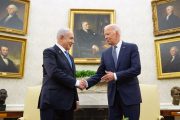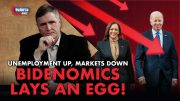
The State Department gave a globalist think tank nearly $1 million to help opposition parties oust Venezuelan President Nicolás Maduro — the latest example of unconstitutional interference by the U.S. government in that already troubled nation.
According to McClatchyDC, “The State Department’s Bureau of Conflict and Stabilization Operations paid $900,000 to the Atlantic Council in September with instructions to ‘promote non-violent conflict resolution’ in Venezuela.”
The State Department wouldn’t comment on the specifics of the grant, which it says was disbursed under its “Peace Process Support Network” program. The Atlantic Council was a bit more open about it, though it denied being “part of any negotiations between the opposition and Maduro,” reported McClatchyDC. Jason Marczak, director of the think tank’s Adrienne Arsht Latin America Center, “said they are working with partners on the ground in Venezuela to provide the opposition and other members of civil society with the tools needed to work more cohesively as a united coalition through their work organizing talks, collecting data and analysis.”
“What we’re trying to do is address the fractures within the opposition,” Marczak said. “That is then helpful for the opposition’s overall stance because what the government wants is a divided opposition.”
“What this boils down to,” observed Antiwar.com’s Jason Ditz, “is indirect funding for the Venezuelan opposition, one of many times when the State Department has put money into the hands of a think-tank to get them to try to coach a US-friendly opposition movement into being both more successful politically and more beholden to US interests.”
That, apparently, isn’t good enough for congressional hawks, who are peeved that the State Department is trying a slightly more subtle approach than the rest of the Trump administration, which has slapped sanctions on Venezuela as a whole and on specific government officials — sanctions that have accomplished little except adding to Venezuelans’ suffering.
“The United States on the one hand is taking a very forceful stance, on the other is talking about dialogue,” a U.S. source who spoke with officials involved in the grant process told McClatchyDC. “This is naïve. This is stupid. This is a waste of money.”
It’s not as if officials are opposed to spending taxpayer dollars trying to overthrow Maduro, of course. They just “felt that supporting dialogue between the government and the opposition was useless and that the money should have gone to support other efforts in Venezuela,” wrote McClatchyDC. As Ditz pointed out, “Absent from the debate on Venezuela is the option of staying out of the matter entirely.”
That, however, would be the best approach, said Art Thompson, CEO of The John Birch Society, which publishes The New American.
Among the pitfalls of interfering in the internal affairs of other countries is that “to do so legitimizes the idea that it is morally proper,” he contended. “If we can do it, so can others to us. What’s good for the goose is good for the gander.”
Furthermore, he said, the Atlantic Council “is a one-world organization that will use any cause to promote their agenda, which is the unification of the United States into an international order. They have recently worked to counter the populist movement in Europe against the EU. How can they work against freedom in one part of the world and supposedly support freedom in another?”
In fact, the group’s activities in Venezuela may well be harming the cause of freedom. According to Ditz, “Venezuelan opposition figures have long urged [the United States to mind its own business], noting that any whiff of US meddling gives the government an excuse to paint the whole opposition as American puppets” — something McClatchyDC says has already happened — “and justify another crackdown.” Ditz also suggested that “the simple fact that the State Department effort is public knowledge probably more than negates any impact at [sic] might have.”
Donald Trump won the presidency because of his promise to “drain the swamp,” in part by adopting an America-first foreign policy that eschewed Washington’s longstanding pattern of interference in foreign countries. Unfortunately, his administration’s actions in Venezuela and elsewhere have proved to be more of the same.
“The Swamp,” declared Thompson, “is still at work.”



